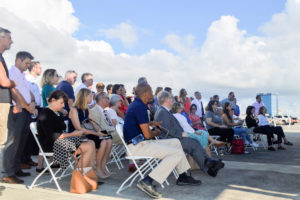Duke Energy technology evaluation manager, George Gurlaskie, led a tour and demonstration of the new battery system. Amy Diaz | The Crow’s Nest
By Amy Diaz
A long-standing partnership between USF St. Petersburg and Duke Energy has led to the addition of a new Tesla battery solar storage system for the parking garage.
The unveiling and demonstration of the battery took place Friday morning, gathering a crowd of about 50 students and faculty on the top floor of the garage.
The new battery system manages the energy captured by the million-dollar solar array, which was installed in 2015 on top of the parking garage. The battery can hold up to 250 kilowatts of energy and can be used as a backup power source.
It is the only system of its kind in commercial use in Florida.
Catherine Stempien, Duke Energy’s state president in Florida, spoke of her support for solar energy and battery storage during the reveal of the new system.
“They are a clean energy resource that provides a unique and flexible grid reliability that our customers want,” Stempien said. “They can support critical facilities, especially things like hurricane shelters in the local communities that we serve.”
In the event of a power outage, the parking garage will switch seamlessly to the battery and continue to provide light, functioning elevators and electric vehicle charging stations.
Additionally, if the solar system produces more energy than is used, the extra energy is fed back to Duke Energy’s grid. It can monitor how much energy is sent back and provide USF St. Petersburg with a credit for the value of that power.
“We’re also excited to announce today a new digital monitoring interface here right on campus,” Stempien said. “That’s going to allow faculty and students to really do real-time monitoring of the solar system and use that in their education.”

The monitoring kiosk, on the first floor of the parking garage, will display the amount of solar energy captured as well as how the energy is managed by the system. The data is also available online at https://dashboards.epri.com/duke-usfsp-parking/dashboard.
George Gurlaskie, a technology evaluation manager with Duke Energy, demonstrated the monitoring website and led the tour to the Tesla battery on the first floor of the garage.
The website provides a dashboard of the microgrid system, showing current battery and solar performance, as well as data collected over time.
“We can see currently we’re making 33.1 kilowatts and that’s live, what’s happening right this second,” Gurlaskie said. “We can also see historically, since 2016, we have made 383,191 kilowatts with this solar ray. That’s a good bit of power and energy.”
The website provides solar generation equivalents and equates that number to the amount of energy needed to power seven professional football stadiums.
Gurlaskie encourages students, faculty and anyone interested in our solar output to visit the site and explore the data.
Regional Chancellor Martin Tadlock said he feels that the new battery system is reflective of who we are at USF St. Petersburg.
“We are not only a place where innovation shines, which is appropriate with the solar array,” Tadlock said. “We want to become Florida’s sustainability campus and we want to be known for that.”
USF St. Petersburg has made a lot of progress in this arena, having earned multiple Leadership in Energy and Environmental Design (LEED) certifications that indicate energy and resource-efficient buildings.
The St. Petersburg campus’ science warehouse labs is the only platinum LEED certified facility in the USF system.
The campus also has three gold LEED certified facilities on campus: the Science and Technology building, the University Student Center and Lynn Pippenger Hall.
In 2017,The Princeton Review designated USF St. Petersburg as one of 375 green colleges in the United States.
Still, Tadlock emphasized the importance of an individual commitment to being more sustainable.
“I think it’s incumbent on all of us to make some kind of commitment to reduce consumption, be more sustainable in everyday life, and have an impact on the future of this planet,” Tadlock said.


